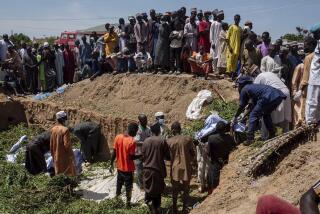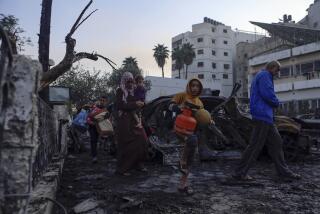Death Toll in Nigeria Pipeline Blast Put at 200
- Share via
ADEJE, Nigeria — The confirmed death toll from a fiery explosion at a gasoline pipeline in the Niger Delta jumped to 200 on Friday, pushed up by the discovery of more bodies and the deaths of badly burned villagers.
And the number could go higher still: Many of the injured--including those who have serious burns--are in hiding, fearful of arrest in connection with Monday’s blast. Some bodies were hastily disposed of by villagers.
Ministry of Health official Chris Oghene Chovwen said at least 200 people were confirmed dead. Fullman Akpere, a municipal official, said about 180 were killed on the spot and 20 others died later of their injuries.
The pipeline near the villages of Adeje and Oviri-Court had been vandalized before it caught fire. Most of the victims were impoverished villagers, including many children, who were scooping up gasoline from the pipe when it exploded.
Pipeline sabotage is common in Nigeria, and the penalty in the past has ranged from prosecution to being shot on sight by police.
Nigerian Red Cross workers drove from village to village Friday to try to persuade injured people to seek medical care, but most were nowhere to be seen. Some were apparently being treated by traditional doctors.
“They are afraid of being arrested. And they would prefer to die with their fear,” said Attah Benson, an official of the International Committee of the Red Cross.
One man, suffering burns on his arms, legs and face, turned up at a station set up by the Red Cross team in Adeje. Thirty or 40 others were believed to be in hiding not far away. In nearby Mereje, physician Vincent Oziga said at least two injured people apparently died after refusing to seek treatment.
The burned man in Adeje, 25-year-old Sunday Tumewo, said he had been too frightened to go to a nearby hospital and instead treated his burns himself for several days using a simple antiseptic.
“I was afraid,” Tumewo said without elaborating. “I don’t want to think about what happened.”
Niger state Gov. James Ibori on Thursday urged the injured to go to doctors and promised that they would not be punished.
Yet hospitals were largely empty, and villagers deserted nearby communities after the fire, fearing a police crackdown. By Friday, many had begun returning to their homes.
The elderly parents of 23-year-old Michael Ebiaghere decided to take their injured son to a local hospital Friday after realizing that his life was in danger.
The true death toll from the blast may never be known. Witnesses saw at least 100 corpses a day after the accident. Some local reporters estimated that as many as 250 people were killed and many of the bodies were hastily buried in shallow graves by fearful villagers.
On Friday, the fire ignited by the explosion still smoldered despite intermittent rainfall. The water turned the area into a blackened swamp filled with the overpowering stench of gasoline and corpses. At least 15 decaying bodies still lay in a nearby field.
The tragedy closely resembled an accident in nearby Jesse, where more than 700 people were killed in 1998. Since then, the government has tried to educate villagers about the danger of “scooping,” the illegal practice of scavenging fuel from pipelines.
Nonetheless, the pipeline here had been sabotaged seven times since January, state oil officials said.
Akpere, the municipal official, said scavenging fuel is the only way for many villagers to make a living. He claimed that land, rivers and swamps in the area were badly damaged by the oil industry, hindering farmers and fishermen.
“They can’t fish because the water is polluted. They can’t farm because the land has been destroyed,” he said.
More to Read
Sign up for Essential California
The most important California stories and recommendations in your inbox every morning.
You may occasionally receive promotional content from the Los Angeles Times.













